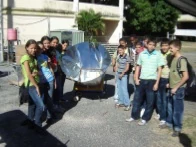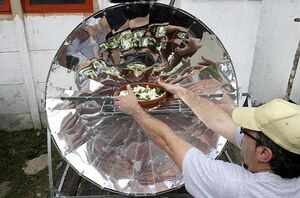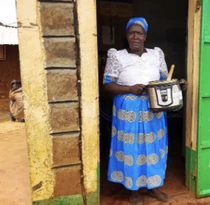m (→Resources) Tag: sourceedit |
Tom Sponheim (talk | contribs) mNo edit summary |
||
| (3 intermediate revisions by 2 users not shown) | |||
| Line 1: | Line 1: | ||
{{GoogleTranslateLinks}} |
{{GoogleTranslateLinks}} |
||
| − | {{Updated| |
+ | {{Updated|8|12|19}} |
| − | |||
<table cellspacing="2"><tr> |
<table cellspacing="2"><tr> |
||
<td valign="top" width="55%">__TOC__</td> |
<td valign="top" width="55%">__TOC__</td> |
||
| Line 10: | Line 9: | ||
</table> |
</table> |
||
==Events== |
==Events== |
||
| + | {{{{PAGENAME}}Events}} |
||
{{CalendarAndPastEvents}} |
{{CalendarAndPastEvents}} |
||
| Line 19: | Line 19: | ||
=={{HeadingHistory}}== |
=={{HeadingHistory}}== |
||
| + | {{SubSection|Solar Energy Research Center}} |
||
When planning was underway for the Second World Conference on Solar |
When planning was underway for the Second World Conference on Solar |
||
Cooking, to be held in Costa Rica, in July of 1994, an abstract for a presentation to be made was received from a Cuban staff member of the Solar Energy Research Center in that nation. The letter told of their work, particularly with solar drying of food and even construction materials, as well as the use of solar energy for purifying and distilling water. What happened is unclear, as the paper does not appear in the program. However, it is evident that some action regarding the use of solar energy for household was taking place at that time. |
Cooking, to be held in Costa Rica, in July of 1994, an abstract for a presentation to be made was received from a Cuban staff member of the Solar Energy Research Center in that nation. The letter told of their work, particularly with solar drying of food and even construction materials, as well as the use of solar energy for purifying and distilling water. What happened is unclear, as the paper does not appear in the program. However, it is evident that some action regarding the use of solar energy for household was taking place at that time. |
||
| + | {{SubSection|Eco-restaurant at the National Botanical Garden}} |
||
Two years later, in 1996, an [[SCI]] volunteer and trainer of many, the late Don Coan of |
Two years later, in 1996, an [[SCI]] volunteer and trainer of many, the late Don Coan of |
||
Sacramento, California, attended a conference on sustainable energy use in Cuba. He |
Sacramento, California, attended a conference on sustainable energy use in Cuba. He |
||
recounted some of the uses of solar energy he was shown during his visit. Sun Oven box cookers, gifts from a visitor, were in use at an Eco-restaurant at the National Botanical Garden. One secondary school had a large parabolic solar reflector that directed sunrays to pots inside the building - it was however not in use at the time of Coan's visit. |
recounted some of the uses of solar energy he was shown during his visit. Sun Oven box cookers, gifts from a visitor, were in use at an Eco-restaurant at the National Botanical Garden. One secondary school had a large parabolic solar reflector that directed sunrays to pots inside the building - it was however not in use at the time of Coan's visit. |
||
| + | {{SubSection|Renewable Energy Group}} |
||
| − | Considerable use of photo-voltaics was evident, and small streams were used to generate hydroelectric power. Waste from the production of sugar is burned as a major source of energy, producing a good bit of pollution, and use of renewable energy would obviously be useful. However, the embargo on goods has made any and all importation difficult and costly. |
||
| − | |||
The Renewable Energy Group at Eastern University, Santiago de Cuba, indicated |
The Renewable Energy Group at Eastern University, Santiago de Cuba, indicated |
||
in 1998 that they had been working on solar cookers for over ten years and had at that time disseminated 200 cookers to families and 50 to schools of the area. It is evident that substantial interest and experimentation has been present in Cuba. |
in 1998 that they had been working on solar cookers for over ten years and had at that time disseminated 200 cookers to families and 50 to schools of the area. It is evident that substantial interest and experimentation has been present in Cuba. |
||
| Line 39: | Line 40: | ||
'''See also''' |
'''See also''' |
||
*{{WikipediaClimate|https://en.wikipedia.org/wiki/Geography_of_Cuba#Climate}} |
*{{WikipediaClimate|https://en.wikipedia.org/wiki/Geography_of_Cuba#Climate}} |
||
| + | *{{NewAug19}}{{EnergySituationEnergypedia}} |
||
*[[Solar cooker dissemination and cultural variables]] |
*[[Solar cooker dissemination and cultural variables]] |
||
==Resources== |
==Resources== |
||
{{ContinentInfo|North America}} |
{{ContinentInfo|North America}} |
||
| − | === |
+ | ==={{HeadingDocuments}}=== |
| + | *{{NewApr18}}'''January 2018:''' Development of Solar Dryers, Cuban Experience for Food Preservation ([[Media:Development_of_Solar_Dryers,_Cuban_Experience_for_Food_Preservation_-_CONSOLFOOD_2018_-_Boris_A._Zaldívar_Núñez,_et_al.pdf|Slides]], [[Media:Development_of_Solar_Dryers,_Cuban_Experience_for_Food_Preservation_-_CONSOLFOOD_2018_-_Boris_Zaldívar_Núñez,_et_al.pdf|Abstract]]) - ''Boris A. Zaldívar Núñez, et al'' |
||
===Articles in the media=== |
===Articles in the media=== |
||
*'''December 2012:''' [http://www.solarthermalworld.org/content/cuba-15-years-gera-solar-thermal-rd-and-testing Cuba: 15 Years GERA Solar Thermal R&D and Testing] - ''Solarthermalworld.org'' |
*'''December 2012:''' [http://www.solarthermalworld.org/content/cuba-15-years-gera-solar-thermal-rd-and-testing Cuba: 15 Years GERA Solar Thermal R&D and Testing] - ''Solarthermalworld.org'' |
||
Revision as of 18:24, 12 August 2019
|
Last edited: 12 August 2019
|
 This large solar box cooker manufactured by Solar Freedom International cooked pizzas for many years at a tourist restaurant in Cuba. |
Events
Featured international events
- 4-6 June 2024 (Bridgetown, Barbados): Sustainable Energy for All Global Forum - The event will be co-hosted by Sustainable Energy for All (SEforALL) and the government of Barbados. It is a platform for government, business and finance leaders, entrepreneurs, and youth and community representatives from around the world to come together to broker new partnerships, spur new investment, and address challenges at the nexus of energy, climate, and development. More information...
Online events
- NEW: Thursday, 18 April 2024 (2:30pm-3:15pm EDT), (Washington, D.C., USA): ESMAP Spring Meetings Knowledge Café: Clean Cooking at the Heart of Energy Access - Join ESMAP for this exciting knowledge-sharing opportunity, which will showcase the role of clean cooking as a key part of energy access and energy transition. Presentations by René van Hell, Director of Inclusive Growth, Ministry of Foreign Affair, Netherlands, Dr. Kandeh Yumkella Chairman, Presidential Initiative on Climate, Renewable Energy and Food Security, Sierra Leone, and Chandrasekar Govindarajalu, Practice Manager, ESMAP, World Bank. In-person attendance at World Bank Atrium, MC Front Lobby is for Spring Meetings registrants only. However, you can watch the event online
Requests for proposal
- Decentralized Renewable Energy Solutions utilizing Solar and Bio-Energy - Sustainable Energy Technologies and Assessments of ScienceDirect, is requesting guest-author submissions. The special issue, VSI: DRES is devoted to publishing research articles reporting the innovative designs and design interventions in solar thermal and bio-energy for decentralized energy systems (DES). It includes i) new and novel designs of prototype or commercial devices and technologies, their development, modeling and simulations and experimental validation; ii) innovations for processes, techniques, utilization, and applications; iii) novel use of materials for improving efficiency, performance, techno-economic feasibility, and sustainability and iv) research findings addressing the socio-economic, health and safety impacts, and life cycle assessments leading to proposing novel devices for DES. The Deadline for submission is 31 July 2024. More submittal information...
- See also: Global Calendar of Events and past events in Cuba
News

GERA project in Santiago de Cuba, Cuba
- January 2013: Utilization of solar cookers in the Basic Secondary School in Santiago de Cuba, Cuba - The Applied Renewable Energies Group (GERA) have successfully been using their versatile solar cookers to introduce solar cooking to seventh grade students at the Basic Secondary School in Cuba. The group feels it is an excellent time to introduce alternative energy strategies to these younger students. At the end of the school year, parents are invited to attend a solar festival at the school to see how the students have put their training into practice. Read more about the project at: GERA student project in Santiago de Cuba, Cuba

Chef Inti Langaney cooks vegetables with a parabolic solar cooker at the El Romero eco-restaurant in Pinar del Rio, Cuba.
- February 2011: The eco-friendly vegetarian restaurant, El Romero, in Pinar del Rio, has begun to offer dishes prepared with solar cookers.
History
When planning was underway for the Second World Conference on Solar Cooking, to be held in Costa Rica, in July of 1994, an abstract for a presentation to be made was received from a Cuban staff member of the Solar Energy Research Center in that nation. The letter told of their work, particularly with solar drying of food and even construction materials, as well as the use of solar energy for purifying and distilling water. What happened is unclear, as the paper does not appear in the program. However, it is evident that some action regarding the use of solar energy for household was taking place at that time.
Two years later, in 1996, an SCI volunteer and trainer of many, the late Don Coan of Sacramento, California, attended a conference on sustainable energy use in Cuba. He recounted some of the uses of solar energy he was shown during his visit. Sun Oven box cookers, gifts from a visitor, were in use at an Eco-restaurant at the National Botanical Garden. One secondary school had a large parabolic solar reflector that directed sunrays to pots inside the building - it was however not in use at the time of Coan's visit.
The Renewable Energy Group at Eastern University, Santiago de Cuba, indicated in 1998 that they had been working on solar cookers for over ten years and had at that time disseminated 200 cookers to families and 50 to schools of the area. It is evident that substantial interest and experimentation has been present in Cuba. Cuba has excellent sunshine and few other fuel resources; hence it could almost certainly utilize solar cooking. Cuba may well be doing more than is known without communicating that information to the international community.
[Information for this section was taken originally from State of the Art of Solar Cooking by Dr. Barbara Knudson]
- Main article: History of solar cooking
Archived articles
Climate and culture
See also
- The climate of Cuba - Wikipedia
- Cuba Energy Situation - Energypedia
- Solar cooker dissemination and cultural variables
Resources
Possible funding
Documents
- January 2018: Development of Solar Dryers, Cuban Experience for Food Preservation (Slides, Abstract) - Boris A. Zaldívar Núñez, et al
Articles in the media
- December 2012: Cuba: 15 Years GERA Solar Thermal R&D and Testing - Solarthermalworld.org
Audio and video
External links
Contacts
The entities listed below are either based in Cuba, or have established solar cooking projects there:
SCI Associates
- Main article: Solar Cookers International Association


